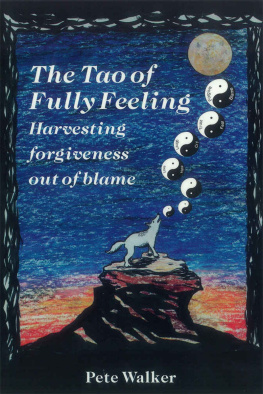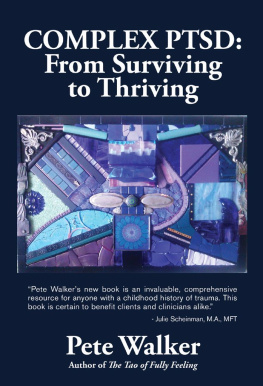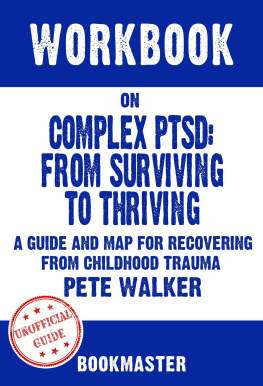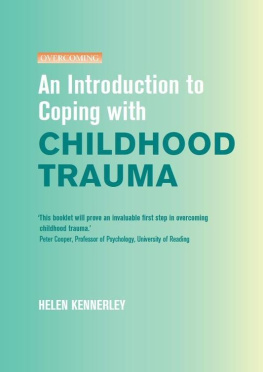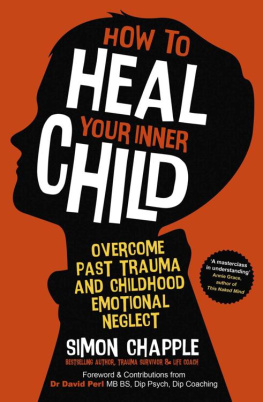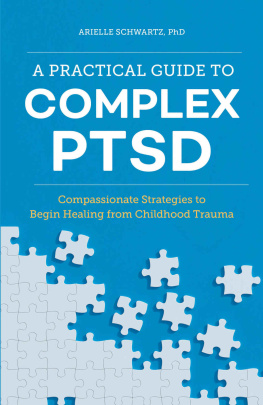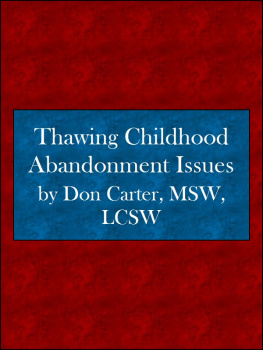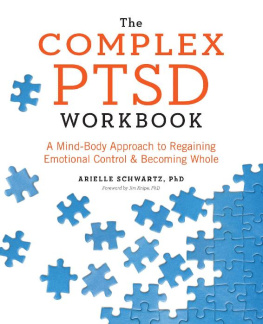THE TAO OF
FULLY FEELING
HARVESTING FORGIVENESS
OUT OF BLAME
PETE WALKER
THE TAO OF FULLY FEELING
AN AZURE COYOTE BOOK / 1995
Second Edition/2015
For information about Azure Coyote publications, please visit:
www.pete-walker.com
Cover Art: Pip Wilson
ISBN 971515079767
Library of Congress Catalog Card Number 94-96296
Copyright 1995 by Pete Walker
All rights reserved
To my best friend, Sat Ferren
who was like a mother to me.
To Jim Dowe
Walt Whitman in a Buick
my most significant father figure.
To my sisters Pat, Diane, and Sharon
whose love helped keep
my heart alive in childhood.
I see there is no prison except that which I construct to protect myself from feeling my pain.
Sheldon Kopp
To be able to invite pain to join in my experience
and not have to control my life to avoid
pain is such a freedom!
Christina Baldwin
CONTENTS
ACKNOWLEDGEMENTS
I am grateful to the many friends, clients, teachers, therapists, and authors whose healing influence is directly and indirectly reflected in this book. I am especially lucky to have had a succession of loving, heart-centered therapists: Jo Gaha, Derek Simmonds, Will Schutz, Bob Rosenbush, and Lisa Schiffer and loving, therapist-friends: Jude Gee, Deb Bonham, Maria Cogburn, Leah Lazar, Randi Myrseth, and Nancy Ashworth. I thank you all for your healing love and wonderful influence in helping me to reclaim the birthright of valuing my feelings and myself. Thank you also for your positive influence in my evolution as a psychotherapist.
I would also like to acknowledge all the psychological and spiritual theorists whose ideas are pivotal in this book. So much comes secondhand through modern proponents of the psychological ideas of Freud and Jung, and the spiritual ideas of Buddha and Lao Tsu. The most formative of these for me have been Ken Wilber, Alice Miller, Elizabeth Kubler-Ross, Sheldon Kopp, Stephen Levine, Steven Arroyo, Alan Watts, Will Schutz, John Bradshaw, Irwin Yalom, Bryan Whittine, Walt Whitman, and all who are included in the bibliography.
I have also used numerous excerpts from Stephen Mitchells wonderful anthology of sacred poetry: The Enlightened Heart, and Robert Bly, James Hillman and Michael Meades anthology: The Rag and Bone Shop of the Heart.
Apologies to all whose ideas I have unconsciously borrowed and not mentioned, and gratitude to God for the unique formulations that have come directly into my own consciousness.
I also deeply appreciate all the adult children of dysfunctional families friends and clients who have shared their painful histories with me. Thank you for helping me validate my observations about the parenting crisis in our culture.
I am also grateful for the editorial help of Robin Bishop who breathed new life into this book at a very crucial juncture and enriched it in many valuable ways. Many thanks also to my good friends Marilyn Clemo and Leah Lazar for their invaluable editing help.
TERMS
The term dysfunctional family refers to any family that damaged a childs inborn self-esteem through any constellation of verbal, spiritual, emotional, or physical abuse and neglect as defined in .
The terms adult child, survivor, and recoveree will be used interchangeably to describe any individual injured by abusive or neglectful parenting in childhood. The term adult child does not imply that adult survivors of dysfunctional families act childishly. It refers to the fact that they arrive in adulthood with many of their developmental needs unmet. Many adult children have yet to acquire the full emotional, relational, and self-expressive capacities of mature adults.
The term inner child refers to the part of the self that is developmentally arrested because important kinds of nurturing were missing in childhood. To some survivors this is merely a useful concept to identify those needs; to others, like myself, there seems to be a historical child-self residing in the unconscious still waiting for the safety and nurturance it needs to come forth and develop a fully functioning adult-self.
The term recovery is used in two ways: firstly, as a global term to describe the overall process of healing the traumas of childhood abuse and neglect. Many recoverees describe this with the phrase: I am in recovery. Recovery is also used to identify specific developmental goals as in: I am working on the recovery of my feelings, and My therapy is helping me to recover my assertiveness. Recovery is best seen as an ongoing process a process of recovering rather than becoming recovered. This helps to avoid the pitfalls of all-or-none evaluating and black-and-white thinking that are common legacies of the dysfunctional family.
The term codependent is used in a narrow sense to describe the adult child who habitually over-sacrifices his needs and desires for someone else. Codependency is commonly the result of a childhood in which the parents needs were routinely elevated over those of the childs.
The term toxic shame describes a distorted mental and emotional state that afflicts many adult children with long periods of feeling overwhelmed and incapacitated by self-loathing. Toxic shame is the product of prolonged exposure in childhood to parental disapproval and disgust. ( explores the irreplaceable role of blame in healing toxic shame.)
The term effective grieving highlights the fact that most survivors are not able to embrace their grief fully and shamelessly enough to find the precious relief it offers. ( explores the most common causes of failed grieving.)
While the nouns feeling and emotion are used interchangeably throughout this book, the verbs feeling and emoting are distinguished from one another. Feeling is the process of passively attuning to and accepting inner affective experiences without trying to change them. Emoting is the process of actively expressing and releasing inner affective experiences, as in crying, angering or laughing.
INTRODUCTION
since feeling is first
who pays any attention
to the syntax of things
will never wholly kiss you;
e.e. cummings
Industrial societies are becoming as soulless as the machine-icons they elevate above humanity. Industrial societies treat feelings as if they are obsolete parts. The Tao of Fully Feeling is a guide to reclaiming the emotional richness we are stripped of in childhood, as our land is stripped of timber and coal.
The Tao of Fully Feeling is born out of my own personal struggle and the struggles of my clients and friends to reclaim their feelings. It is an invitation to discover how feeling and emoting naturally re-prioritize our values so that love and intimacy are once again elevated above acquisition and consumption.
The Tao of Fully Feeling focuses a great deal on the dysfunctional family since that is where societys dictums against feeling are most stringently enforced. I agree with John Bradshaw that our culture is afflicted by an epidemic of poor parenting.
My ideas about family dysfunctionality concur with a number of modern books whose titles alone vividly capture the collapse of the institution of parenting in our culture: Prisoners of Childhood, Betrayal of Innocence, The Secret Everyone Knows, Hearts That We Broke Long Ago, Soul Murder: Persecution in the Family, After The Tears: Reclaiming the Personal Losses of Childhood, Getting Divorced From Mom And Dad , Healing The Shame That Binds You
Next page
